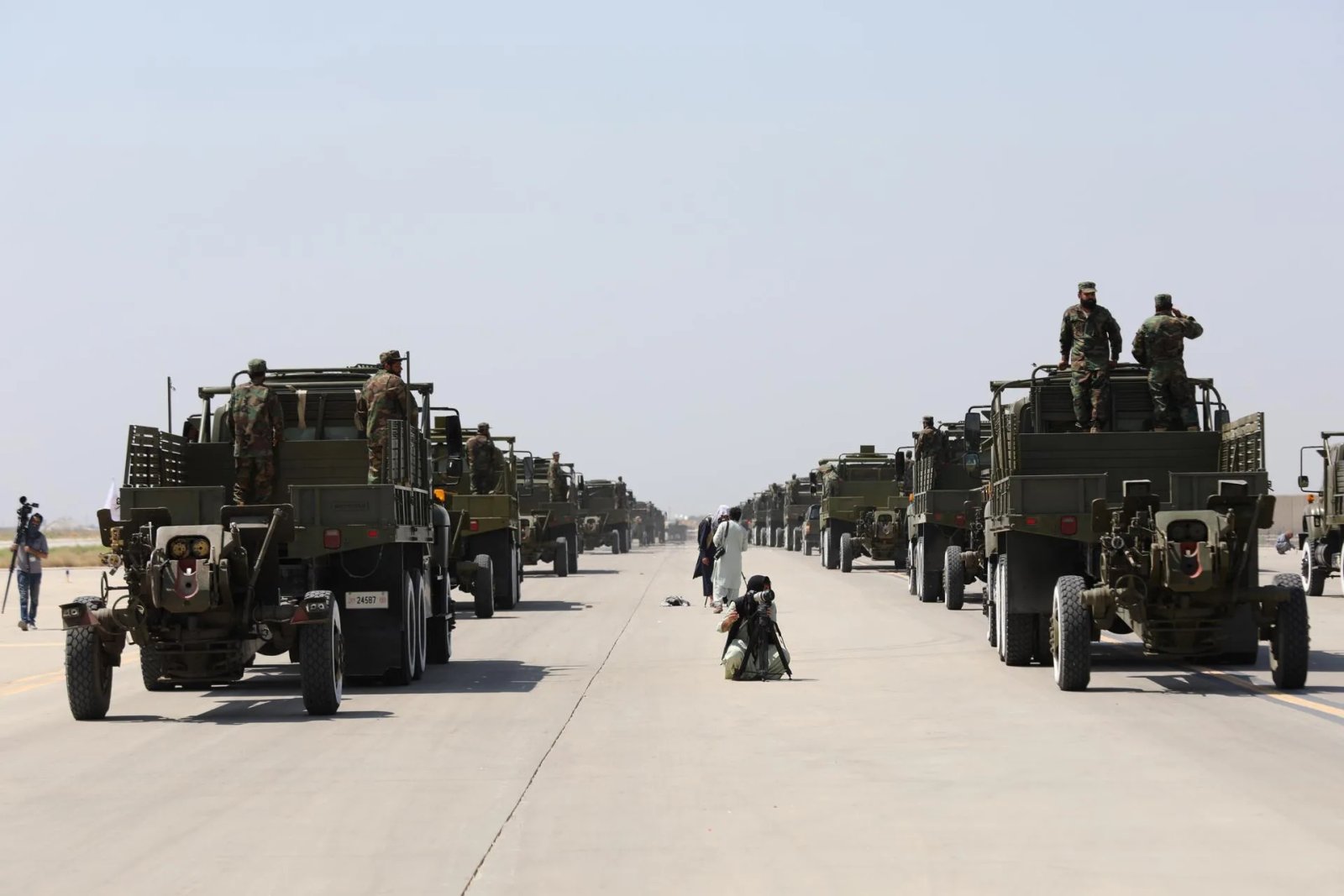In a briefing to mark Donald Trump's 100th day as US president, the White House criticises Amazon as "hostile" and "political"
It follows reports suggesting the online retailer will soon show consumers how much the president's tariffs are adding to the cost of its products
Tariffs – taxes charged on goods bought from other countries – have been a defining issue of Trump's administration, following his decision to place 145% tariffs on Chinese goods and 10% on goods from the majority of other countries
Since re-entering office three months ago, Trump has reshaped the US government with a blitzkrieg of executive actions – critics say the president, who has made extensive use of executive orders, is overstepping his powers, while alienating international allies
But for Trump's supporters, the president is delivering on his election promises
Our correspondents in the US and around the world will be answering your questions throughout the day – email bbcyourvoice@bbc.co.uk, external
This video can not be played
Watch: Trump’s first 100 days… in just 2 minutes
Edited by Sam Hancock and Brandon Livesay
A question now about reports Amazon will soon display how much the Trump tariffs are adding to the cost of each product.
Leavitt steps in, saying she just got off the phone with the president, who was talking about this.
"This is a hostile and political act by Amazon," she says.
She holds up what appears to be a print out of a news article with a large picture of Amazon owner Jeff Bezos, and she claims it shows Amazon is partnered with a "Chinese propaganda arm".
We'll bring you more on this row as we get it.
With that, the White House briefing ends and Leavitt says Trump will hold a political rally tonight in Michigan. Before the rally, he will meet Michigan's Governor, Democrat Gretchen Whitmer, she adds.
Next, Bessent addresses reporters' concerns about market turmoil – following Trump's tariffs – by saying that Trump creates "strategic uncertainty" to get "the best possible trade deals".
"Certainty is not necessarily a good thing in negotiating," Bessent says.
He predicts "the aperture of uncertainty will be narrowing" as US trade deals – of which Press Secretary Karoline Leavitt said there were over 100 during her remarks – are announced.
Now asked about China, Trump's Treasury secretary says the US's tariffs on China are "unsustainable for China".
He claims to have seen data that suggests China could lose 10 million jobs "very quickly", but doesn't specify where these numbers come from.
"The onus is on them" to adjust their tariffs, Bessent says, because China sells more goods to the US.
Pressed about whether talks with Beijing are taking place, Bessent says he won't get into the "nitty gritty of whom is talking to whom".
Reporters are now asking questions – and the first goes to Treasury Secretary Scott Bessent – it's about the tariffs that Trump has imposed on countries around the world in the last few weeks and months.
A reporter asks whether the White House want to create revenue from tariffs, or use them as a way to make new trade deals?
"I think it's a combination of both," Bessent says, adding that revenue made from these tariffs could provide tax relief for US citizens.
Continuing, Press Secretary Leavitt talks about America's economic turn under Trump – including, she says, hundreds of billions of dollars the government is poised to save by cutting waste and trillions in domestic investments – including in AI.
"President Trump is America's businessman in chief," she says.
She then touts Trump's tariffs and says more than 100 countries have come to the table to negotiate.
Leavitt begins her briefing to mark Trump's first 100 days in office by calling it the "most historic start" of any US president.
She is focusing on the economy, and talking about a recent jobs report which she says shows the president's efforts are working.
Behind her stands Treasury Secretary Scott Bessent, the man who is at the helm of Trump's global tariffs agenda. We're due to hear from him shortly, too.
We're due to hear from White House Press Secretary Karoline Leavitt soon.
It's an unusually early briefing but as part of Trump's 100 days being marked, the White House is organising them earlier this week.
Today, Trump's Treasury Secretary Scott Bessent will join Leavitt to speak to reporters.
We'll bring you any key lines right here and you'll also be able to watch live at the top of this page.
Another key indicator people look at after a president's first 100 days is the stock market.
Stock indexes show the total value of the companies listed on them – how much the shares of the companies are worth.
These valuations can be sensitive to government policies, but they can also be impacted by all sorts of things outside of a president's control.
In President Trump's case, the stock markets reacted badly – their values dropped – after he announced a large escalation of tariffs on goods coming into the country.
He has since rowed back on some of these tariffs, while others remain in place, as does a lingering sense of uncertainty over how the policy may change going forward.
Polling – an attempt to assess what a nation thinks based on samples – is a key part of taking stock of a president's first 100 days.
US polling firm Gallup has used and compared the 100-day milestone for decades.
Its recent polling finds Trump is the only post-war president to have less than half the public’s support after 100 days, in both his terms.
John F Kennedy enjoyed 83% of public approval and Ronald Reagan had 67% at this point. Joe Biden and Bill Clinton were less popular, but still above 50%. Trump is now on 44%, and at this point in 2017 was on 41%.
But that's the overall approval rating. When breaking down respondents by party support, the picture changes – Trump has by far the largest party split. Nine out of 10 Republicans support him versus only 4% of Democrats.
Gallup’s polling was conducted from 1-14 April, during a period of market turbulence in response to Trump's trade tariffs.
But the reading of 44% does not indicate an immediate change to Trump's polling, which has been stable during the first quarter of his second term.  Chris Mason
Chris Mason
Political editor
We've another tariffs-related question to bring you now, this one from Mark in the UK who says: The US has a number of military bases on British soil – should we, as a nation, remind Trump of this and use it as a concession for the UK to be exempt from tariffs?
This question gets us to some of the architecture of the much talked about so-called "special relationship" between the United States and the United Kingdom.
At the heart of it is a law from 73 years ago – the Visiting Forces Act 1952, external.This was built upon just over 20 years later with a Cost Sharing Agreement in 1973, external. The UK Defence Journal wrote about this recently, external and there was an exchange in Parliament about the issue too, external.
It's a reminder of how intertwined the relationship between the two countries is, whoever is in power in London or Washington. There's no doubt that all sorts of elements of the cooperation between the UK and the US is being pointed out in the negotiations that are currently going on.
But remember, Europe has collectively been winded by the Trump administration’s obvious irritation at what the White House sees as its subsidising of European security, which it might see these bases as examples of.
The UK, meanwhile, sees the bases as part of its own security as well as being an American asset, which it helps facilitate and pay for. Dharshini David
Dharshini David
Deputy economics editor
Throughout today, our correspondents here in the UK, in the US and around the world will be answering your questions about the Trump administration and their first 100 days in office.
If you've got one that you think should feature in our coverage, just email bbcyourvoice@bbc.co.uk.
The first of these comes from Craig, in Glasgow, who asks why – if the US is imposing such high tariffs – don't we just cease trading with them? Here's my response:
The amount the US sells to the rest of the world equates to more than 10% of its annual income, or GDP. Refusing to buy American would deal that economy a crippling blow.
But consider what the US sells: it’s one of the biggest producers of soy beans for animal feed and a key supplier of oil – staples not easily replaced. Nor are some of the more sophisticated items it manufactures – aircraft parts and machinery.
Plus Americans still account for about $1 (75p) in every six spent by consumers globally – not selling to them would be disastrous for many industries in countries around the world: carmakers in Germany, pharmaceutical companies in the UK, electronics manufacturers in China and textile factories in Bangladesh, to name a few.
Having said that, the Trump trade wars have prompted countries to cast around, to develop other trading partners and markets. But such things take time – and may still mean there’s a higher price tag involved for consumers.
Donald Trump was surrounded by his family as he was sworn in as the 47th US president in January, inside the Capitol building – the ceremony moved indoors due to freezing temperatures
Trump has signed 142 executive orders since beginning his second presidential term – there's more on them in our last post
Tariffs have been a key feature of his first 100 days and at a so-called "Liberation Day" event at the White House, Trump used a chart to show which countries the US would be imposing import charges on – and by how much – sending shockwaves through the world's financial markets
Elon Musk, the Tesla CEO who has been overseeing the Trump administration's cost-cutting team known as Doge, has been pictured with his son X in the Oval Office with Trump
In a heated Oval Office meeting in March, Vice-President JD Vance accused Ukraine's President Zeleneksy of being "disrespectful" to the US, while Trump urged him to make a deal with Russia "or we are out"
Donald Trump has signed 142 executive orders in his first 100 days (according to a tally from the American Presidency Project, external). By comparison, Joe Biden signed 162 executive orders during his four years as president.
But what even *is* an executive order?
They are written orders issued by the president to the federal government, which – crucially – do not require congressional approval.
Many of Trump's orders have reversed Biden-era policies, including a pause on foreign aid. Others have focused on diversity and gender – for example, by eliminating diversity, equity and inclusion (DEI) programmes within the federal government and barring transgender recruits from enlisting in the military.
Immigration and border security, an issue Trump campaigned heavily on, have also featured. Trump declared a national emergency caused by illegal migration, and has ordered that officials deny the right to citizenship to the children of migrants either in the US illegally or on temporary visas.
He has even taken action against paper straws.
Trump's use of executive orders – both swift and broad – carry the weight of law, but can be more easily overturned. Some face legal challenges. Sakshi Venkatraman
Sakshi Venkatraman
Reporting from New York
A president’s first 100 days are not always a sure-fire metric of their success – but they tend to set the tone for what their tenure will look like.
They’ve also become a way for the public to get a sense of whether promises made during the campaign were actually kept.
The practice of looking at a president's first 100 days really started with Franklin D Roosevelt, who took office in 1933 during the Great Depression.
His sweeping changes in his first 100 days gave him massive popularity, and many credit that work with pulling the country out of the downturn.
Presidents tend to enjoy a honeymoon period after they take office – but polling suggests that has not been true for Trump so far. We'll have more on that later. Imogen James
Imogen James
Reporting from Washington DC
It’s been 100 days since Donald Trump returned to the White House for his second term as president of the United States.
In that time, there has been a trade war sparked by his tariffs, a flurry of executive orders, and both protests and support for his administration.
It has been eventful, to say the least.
The president is making dramatic changes at a rapid pace. And his decisions are being felt at home and across the world.
For decades, the 100-day milestone has been viewed as a symbolic moment to gauge a president's progress.
So today we'll look back, and forward, to see what Trump has done – and what is still to come.
Louis meets Israeli West Bank settlers
A satirical look at the week's news
Hidden gems from the BBC's music archive
Hugh Bonneville narrates Sherlock Holmes
Copyright © 2025 BBC. The BBC is not responsible for the content of external sites. Read about our approach to external linking.
White House blasts 'hostile' Amazon over tariffs while marking Trump’s 100 days – live updates – BBC



